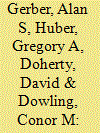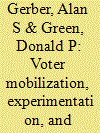|
|
|
Sort Order |
|
|
|
Items / Page
|
|
|
|
|
|
|
| Srl | Item |
| 1 |
ID:
105174


|
|
|
|
|
| Publication |
2011.
|
| Summary/Abstract |
We report the results of the first large-scale experiment involving paid political advertising. During the opening months of a 2006 gubernatorial campaign, approximately $2 million of television and radio advertising on behalf of the incumbent candidate was deployed experimentally. In each experimental media market, the launch date and volume of television advertising were randomly assigned. In order to gauge movement in public opinion, a tracking poll conducted brief telephone interviews with approximately 1,000 registered voters each day and a brief follow-up one month after the conclusion of the television campaign. Results indicate that televised ads have strong but short-lived effects on voting preferences. The ephemeral nature of these effects is more consistent with psychological models of priming than with models of on-line processing.
|
|
|
|
|
|
|
|
|
|
|
|
|
|
|
|
| 2 |
ID:
090823


|
|
|
|
|
| Publication |
2009.
|
| Summary/Abstract |
Survey data regularly show that assessments of current and expected future economic performance are more positive when a respondent's partisanship matches that of the president. To determine if this is a survey artifact or something deeper, we investigate whether partisanship is associated with behavioral differences in economic decisions. We construct a new data set of county-level quarterly taxable sales to examine the effect of partisanship on consumption. Consumption change following a presidential election is correlated with a county's partisan complexion, a result consistent with partisans acting outside the domain of politics in accordance with the opinions they express in surveys. These results support an expansive view of the role of partisanship in mass politics and help validate surveys as a method for studying political behavior
|
|
|
|
|
|
|
|
|
|
|
|
|
|
|
|
| 3 |
ID:
105197


|
|
|
|
|
| Publication |
2010.
|
| Summary/Abstract |
Partisanship is strongly correlated with attitudes and behavior, but it is unclear from this pattern whether partisan identity has a causal effect on political behavior and attitudes. We report the results of a field experiment that investigates the causal effect of party identification. Prior to the February 2008 Connecticut presidential primary, researchers sent a mailing to a random sample of unaffiliated registered voters who, in a pretreatment survey, leaned toward a political party. The mailing informed the subjects that only voters registered with a party were able to participate in the upcoming presidential primary. Subjects were surveyed again in June 2008. Comparing posttreatment survey responses to subjects' baseline survey responses, we find that those reminded of the need to register with a party were more likely to identify with a party and showed stronger partisanship. Further, we find that the treatment group also demonstrated greater concordance than the control group between their pretreatment latent partisanship and their posttreatment reported voting behavior and intentions and evaluations of partisan figures. Thus, our treatment, which appears to have caused a strengthening of partisan identity, also appears to have caused a shift in subjects' candidate preferences and evaluations of salient political figures. This finding is consistent with the claim that partisanship is an active force changing how citizens behave in and perceive the political world.
|
|
|
|
|
|
|
|
|
|
|
|
|
|
|
|
| 4 |
ID:
099289


|
|
|
|
|
| Publication |
2010.
|
| Summary/Abstract |
Previous research on personality traits and political attitudes has largely focused on the direct relationships between traits and ideological self-placement. There are theoretical reasons, however, to suspect that the relationships between personality traits and political attitudes (1) vary across issue domains and (2) depend on contextual factors that affect the meaning of political stimuli. In this study, we provide an explicit theoretical framework for formulating hypotheses about these differential effects. We then leverage the power of an unusually large national survey of registered voters to examine how the relationships between Big Five personality traits and political attitudes differ across issue domains and social contexts (as defined by racial groups). We confirm some important previous findings regarding personality and political ideology, find clear evidence that Big Five traits affect economic and social attitudes differently, show that the effect of Big Five traits is often as large as that of education or income in predicting ideology, and demonstrate that the relationships between Big Five traits and ideology vary substantially between white and black respondents.
|
|
|
|
|
|
|
|
|
|
|
|
|
|
|
|
| 5 |
ID:
149370


|
|
|
|
|
| Summary/Abstract |
Field experiments on voter mobilization enable researchers to test theoretical propositions while at the same time addressing practical questions that confront campaigns. This confluence of interests has led to increasing collaboration between researchers and campaign organizations, which in turn has produced a rapid accumulation of experiments on voting. This new evidence base makes possible translational works such as Get Out the Vote: How to Increase Voter Turnout that synthesize the burgeoning research literature and convey its conclusions to campaign practitioners. However, as political groups develop their own in-house capacity to conduct experiments whose results remain proprietary and may be reported selectively, the accumulation of an unbiased, public knowledge base is threatened. We discuss these challenges and the ways in which research that focuses on practical concerns may nonetheless speak to enduring theoretical questions.
|
|
|
|
|
|
|
|
|
|
|
|
|
|
|
|
|
|
|
|
|